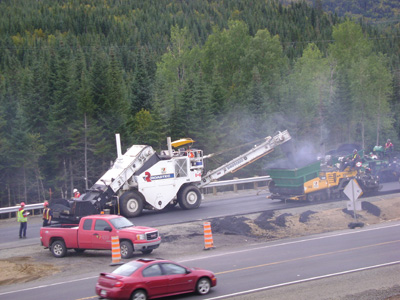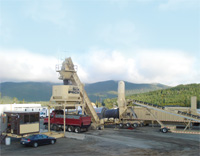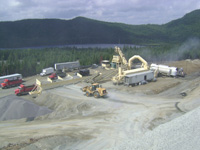
Features
Company Profiles
Roads & Paving
Pavage Portneuf paves way to solid growth
This third-generation business is taking advantage of soaring infrastructure investments
October 18, 2010 By Scott Jamieson
Any decent farmer knows to make hay when the sun shines. For Quebec’s
aggregates and roadbuilding sector, the sun has been shining brilliantly
for the past few years, and there seems to be nothing but blue skies on
the horizon.
Any decent farmer knows to make hay when the sun shines. For Quebec’s aggregates and roadbuilding sector, the sun has been shining brilliantly for the past few years, and there seems to be nothing but blue skies on the horizon.

|
|
| The Roadtec SB-2500D Shuttle Buggy transfers material to a Volvo paver at KM 95 of the Route 175 twinning project. Laid over two years, total paving depth is 195 millimetres.
|
These are the years of mega-projects: Highways 50 and 30 in the Montreal region, and the twinning of Highway 175 north of Quebec City. These billion-dollar projects are in addition to an endless stream of road repairs, expansions, and infrastructure replacement. From 2007 to 2014, the province will invest almost $24 billion into its road network, for a pace of over $3 billion per year. In 2010-11 alone, the Ministère des Transports du Québec (MTQ) expects to spend $3.5 billion on its roads, with another $700 million coming from the federal government.
The pace is blistering, as the province makes up for years of infrastructure neglect. For the well-prepared and competitive road construction and paving companies, these are good times.
“I think we’re in the best years right now,” explains Sébastien Savard, project manager for Construction & Pavage Portneuf Inc. (Portneuf Construction and Paving). Based in Saint-Marc-des-Carrières, a small town about 45 minutes northwest of Quebec City, the family-owned business has seen steady growth almost since its birth in the 1940s. In the past decade, that growth has been relentless.
“These are the hot years – you’ve got to be here, and if you want to grow, this is the time. Right now the word is that the government has much more work than they can hope to get done in any given season, and the MTQ engineers tell us that we’ll have another 10 years like this. We prefer to be more conservative in our own forecasts, but it’s still clear that there are at least another three or four good years.”
Going urban
Construction & Pavage Portneuf is not wasting this busy market. Once considered a “country paver,” content with the local highway contracts that it specializes in (the company is just a few kilometres from Highway 40 running between Quebec City and Montreal), the business has expanded in recent years into new markets far from its rural comfort zone. The first move came in 2007, when the company moved into the lucrative but highly competitive Quebec City market. In many ways, Savard says, the move started out as a bold defensive play, but it has paid off.
 |
|
| Sébastien Savard (shown in the Saint-Marc office) and his cousin Alain Savard are third-generation roadbuilders in this growing family business, and typify the aggressive corporate spirit. “When we won the contract, we faced a dilemma – we didn’t have a portable plant that could do the job. We had to find one in a hurry,” he says with a wink.
|
“We always worked out here in the country, and that was fine. Even earlier expansions were always in the regions, such as buying Pavage Sartigan in Beauce. But we saw the larger players from Quebec City coming up here and taking the best highway contracts. Their fixed costs were lower because of their volume. One day we had enough – the road runs both ways between here and the city, so we decided to go down there and look for work. Now the little guy from the country has moved into the city,” Savard says with a sly smile.
The established contractors were in for a surprise, Savard adds. In the first year, Construction & Pavage Portneuf took almost all of the major highway jobs in the provincial capital region. The timing was good, as the region has been abuzz with road construction ever since. To support those successful bids, the company opened a large batch asphalt plant in the suburb of Saint-Augustin-des-Desmaures, on the city’s west side. With contracts in the works, the project was a stressful one, but the end result is a modern 8,000-pound batch plant with three silos (200 tons), automated scale and modern controls from Marcotte Systems that allow the company to meet the needs of a hectic urban paving business working Quebec City’s congested roads.
“We hit the ground running in that market. We had won three contracts and the plant hadn’t even been started yet. There was no margin for error, and the demands were high. There are a lot of limitations on when you can work, and when you can, you need all the asphalt you can get your hands on. You’d better be able to produce 400 tons per hour, or forget it. The Saint-Augustin plant is built with that in mind.”
At $5 million and a lot of leg work getting permits and gathering equipment, the project was a handful for the private company. Still, Savard says the move has been key to the company’s recent growth spurt, and continues to pay dividends. So too is the role played by his cousin, and fellow third-generation family member Alain Savard. As asphalt crew director, Alain keeps this growing division rolling.
The company has supported this growth on the paving side with corresponding growth on the road construction and infrastructure side. Construction & Pavage Portneuf has five or six road construction crews running at any given time, and can handle aqueduct/culvert work as well, providing a one-stop shop for clients who prefer the turnkey approach.
“It has become necessary to be able to do it all. Roads are not just pavement; now you need to be a general contractor, and we’re seeing more of that in our work in the city. Either you work as a sub-contractor, or you do it all. So we do it all.”
On the move
The next big leap for Construction & Pavage Portneuf came just last summer when the aggressive company decided yet again to bid on a job it was not yet set up to handle. Highway 175 is a 200-kilometre stretch of road between Quebec City and the regional economic powerhouse of Chicoutimi. Blasted through rock and mountainous terrain, the two-lane connection has long been plagued by poor weather, errant wildlife, high volumes, and impatient drivers trying to make time between the two cities. It has been one of Canada’s most dangerous highways, where horrific accidents are all too common.
 |
|
| The Astec Portable 300 Six Pack hot-mix asphalt plant set up at its original site on KM 110. The complete plant includes Double Barrel drum mixer, cold feed, scalping screen with inclined conveyor, baghouse, surge bin, drag conveyor and control house. Pavage Portneuf went with the full digital control package.
|
To improve the flow and increase safety, provincial and federal governments have pooled resources to twin the entire stretch of road. Originally slated at $700 million, the most recent estimate this summer puts the total closer to $1.1 billion. Controversies aside, the project is an impressive one, as Savard says.
“It’s a true mega-project; you have to see it. At any time as you drive up you’ll see six or seven very large companies all working on their own $20-million contract, and this is just one season. We’re looking forward to another two years yet.”
Much like the Quebec City market they had recently moved into, this multi-year, multi-contract project seemed to be lacking in competition at times. “We noticed there were only a few bidders. So we decided we’d bid a job too, and we won it. No one saw us coming, and with reason. We didn’t have an asphalt plant big enough to handle the job. We had a portable Gencor we bought in 1999, but it was only a 150-ton plant. So we had a familiar dilemma – a contract but no plant to feed it.”
The company ran seven asphalt plants at the time – six batch and the Gencor – so it was no stranger to the equipment world. Savard says it did not take them long to settle on the plant they wanted: A portable Astec Double-Barrel 300 Six Pack (300 tons per hour). “We have a lot of experience with asphalt plants, and we had run our own portable plant for 10 years, so we knew what we wanted in this plant. If it had been on price alone, there’s no way we’d have this plant. It’s not cheap. But when you know equipment, you appreciate the way these things are put together, and they are a complete plant. Also, they said they could get us one in time, which was no small matter.”
In fact, Savard says the plant arrived a full week early. Learning from their experience with the first portable plant, they had the Six-Pack delivered to their company site in St-Marc. There, with the help of Astec technicians, they set it up for the first time and learned how to operate and troubleshoot it in a friendly environment.
“We looked at all the portable plants and this was clearly the production and quality level we wanted – better than anything else we saw. Still, you always want to fine tune a plant to fit your needs. Anything we wanted to speed up we did right here in our yard, so when we hit the job site on the 175, we were up and running right away.”
The first contract involved the stretch of road from KM 114 to KM 95, a 140,000-ton project worth $17 million. The company handled everything from sourcing aggregates to road construction and paving, using its fleet of Roadtec Shuttle Buggies for the latter. They set the Astec Six-Pack at KM 110 last summer. Run in two-year cycles, the contract calls for putting down two layers the first year, followed by the final layer the next summer after a complete freeze and thaw cycle has passed, for a total surface of 195 millimetres.
By late July 2010, the company was ready to relocate the plant to start a new project, a separate $8-million, 80,000-ton project running from KM 77 to KM 84. The plant was moved 15 kilometres to KM 95, a move that was timed with the province’s construction holiday to limit the impact on the project. Despite being its first relocation in the field, they were up and running within five days.
“We started the breakdown on Monday, July 26, and were making asphalt by the 30th with no issues.”
The new site also features the company’s own quarry. While permitting was a challenge (the park the highway runs through features traditional First Nations trails among other things), the company now has the entire supply chain under control.
“We have all we need to be efficient now,” Savard says of the company that already runs over a dozen quarries and sandpits across the province. “We have our own quarry, set up the way we like right next to our own asphalt plant.”
One of the main reasons Construction & Pavage Portneuf chose Astec for this key investment was the supplier’s reputation for parts support and service. With short operating seasons and tight deadlines for these projects, Savard admits downtime can be a killer. In the year since starting up, they’ve had opportunity to test that reputation, and he says they have not been disappointed to date.
“As a family company, we are used to being able to reach people when we need to. My cell phone is always on, and the crews know they can reach me anytime. If there’s a problem that could be costing us money, we’re not going to wait to fix it. That’s a family business, and despite our growth and over 250 employees, we try hard to maintain that family attitude about everything. You get the same impression from Astec: 24-7 you can speak to someone, and they give you the feeling that you’ve been dealing with them for years. It’s a culture, and they have it. It’s important, because in Quebec, you’ve got to make asphalt when it’s time to make asphalt.”
At between $4 and $5 million with all the peripherals (laboratory, loader, etc.), the plant is a major investment Savard admits. But so far they like the return on investment.
“Yeah, it’s a big investment for us. But to date we’ve had $25 million in work come to us that we’d never be able to do without, and it fits in well with our operation. It keeps our people working, which for us is a key factor. We’ve spent a lot of time and effort over the past decade bringing in new people, and the average age of our team has fallen quite a bit. That’s important for our future, and this plant helps keep them all working.”
In the end, Savard says plants like this may play a key role down the road in making sure the company has the work it needs. Even if it means moving more often than once per year, that may be the price to keeping a full slate of projects on hand.
“Like I said, the next few years look very good. After that, who knows? The onus is on us to make sure we have the work we need, and that’s what I like about having the Astec plant. Rather than wait for contracts to come to our region, we can follow the work.”
So far, following work is a growth strategy that’s working.
Growth through generations Construction & Pavage Portneuf actually got its start in the 1940s when Sébastien Savard’s grandfather Rosaire started a commercial construction company in Saint-Marc-des-Carrières, Que., a small construction and forestry town about 45 minutes northwest of Quebec City. Rosaire’s four sons Vincent, Herman, Julien, and Renald (Sébastien’s father) all worked for the company, and in the 1970s bought out the business. From that point on, growth and change has been the one constant. Construction & Pavage Portneuf actually got its start in the 1940s when Sébastien Savard’s grandfather Rosaire started a commercial construction company in Saint-Marc-des-Carrières, Que., a small construction and forestry town about 45 minutes northwest of Quebec City. Rosaire’s four sons Vincent, Herman, Julien, and Renald (Sébastien’s father) all worked for the company, and in the 1970s bought out the business. From that point on, growth and change has been the one constant.
1970s: Company focuses on building large federal docks and concrete breakwaters, running its own concrete plants. |
Print this page